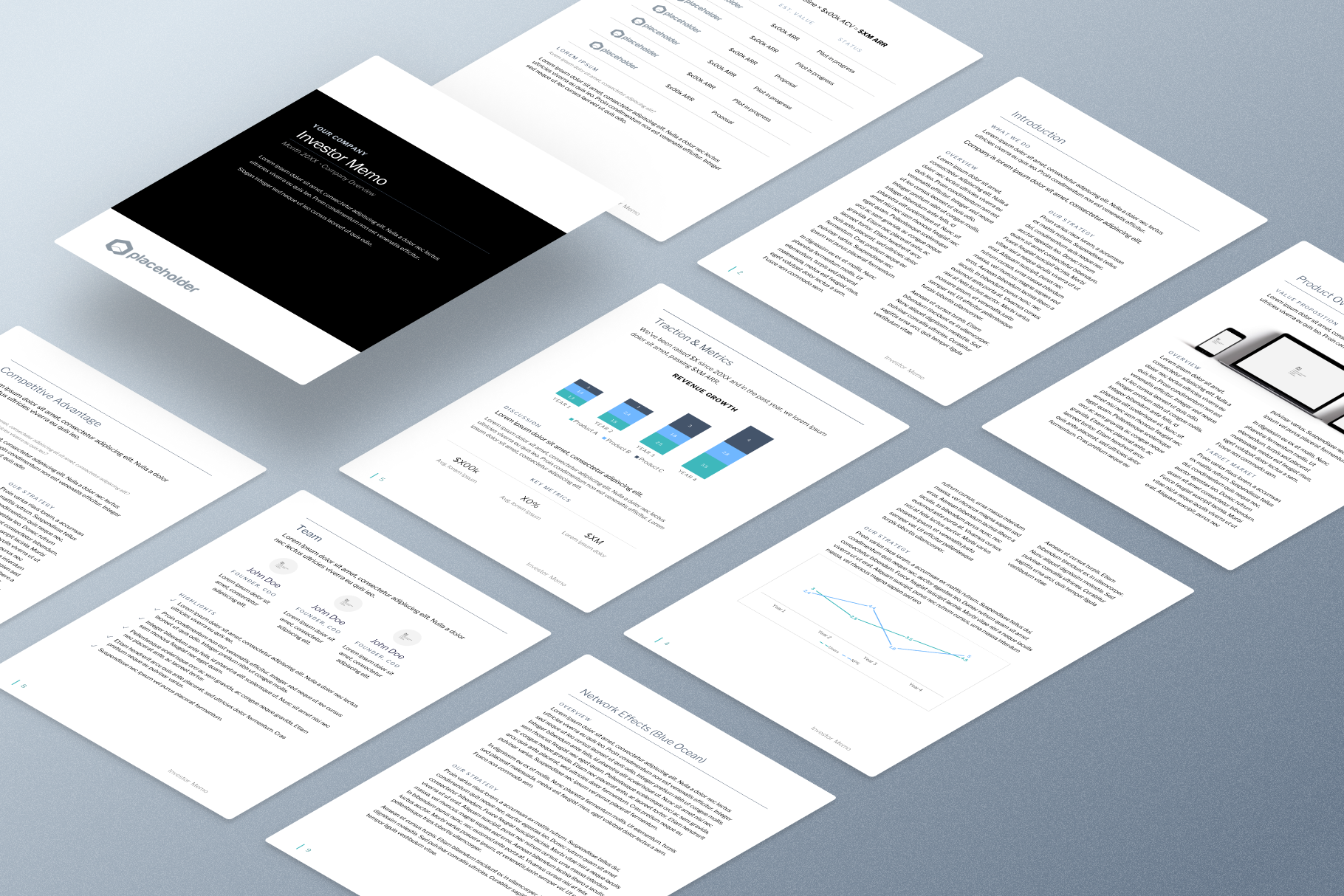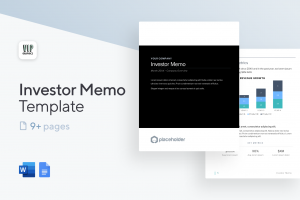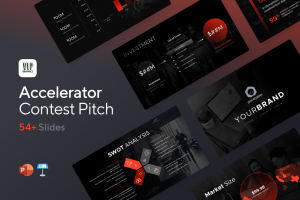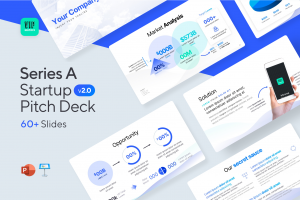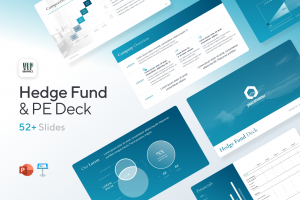Rippling took an unusual approach when raising their $45 million Series A led by Kleiner Perkins in 2019: they used “no formal Pitch Deck” as the center of their fundraising materials. In lieu of the traditional pitch deck, Rippling presented an Investor Memo: a simple document which laid out the company’s pitch in prose form.
This approach took advantage of the storytelling strengths of the written medium, while showcasing important data such as graphs, charts, and tables in an accompanying set of 46 supplementary slides. Rather than share fragmented Excel sheets for due diligence, Rippling packaged their data room into comprehensive, organized slides with metrics, projections and detailed footnotes.
Rippling is an employee management platform designed to simplify HR operations and IT management. Their software provides companies a single, centralized platform to manage employees’ payroll, benefits, devices, apps, and more. The company reportedly reached $16.8M in revenue with over 2,000 customers in the following year (2020).
That said, as Rippling themselves remarked, fundraising success is determined primarily by your business success and market opportunity, although your fundraising materials & strategies are certainly a worthwhile optimization. Entrepreneurs across industries can draw from Rippling’s example of how-to streamline the fundraising process for all parties.
Here is the investor memo Rippling used to securing $45 million in funding from leading venture capital firms like Kleiner Perkins:
What was included in the Rippling investor memo?
Browse the exact investor memo that Rippling used to securing $45 million Series A round from Mamoon, Ilya, and Kleiner Perkins.
Why choose an investor memo?
While pitch decks have become the default format for startup fundraising, they have one major downside: presentations function best as a visual aid to an in-person meeting.
Often, something’s lost due to the fact that the founders can’t afford to personally walk every associate, partner, and GP at each VC firm through the deck in-person.
In contrast to a pitch deck, a memo offers a variety of advantages:
- Investor memos are standalone. With an investor memo, you don’t have to worry whether someone reading without you there will grasp the story. Investors can digest the full pitch before they meet you, so you can use that time to discuss questions or objections, instead of spending the entire meeting performing “the pitch.”
- Investor memos requires less face time. Although raising funds doesn’t have to be competitive, the process moves quickly, and the founder’s time can be the limiting factor. The number of firms you can seriously engage is naturally limited by the number of hours in the day. A standalone pitch memo lets you know up front whether there is interest, so you can focus on the firms that are the best fits.
- Investor memos aligns with what the sponsoring GP’s will ultimately put together. The final step in a VC’s evaluation of your company is typically a partnership meeting on Monday morning. You’re not the only one in the hot seat once you’re this far in the fundraising process:General Partners who are interested in leading your deal must typically write a memo outlining the reasons for the investment. In other words, your GP is poring over notes about your company and deck in preparation for the partnership memo while you’re practicing in front of the mirror. When you write this for them, you increase your chances of your company being portrayed in the best light.
The metrics deck: making diligence effortless
Whereas the investor memo shares the story of your company (ie. the problem, mission, vision, and roadmap), the Metrics Deck should provide investors a clear and in-depth view of your company today (ie. metrics, traction, sales pipeline)
The goal of an appendix should be to anticipate every question and data request that investors may have and provide it to them up front, so excited firms can move quickly and aren’t blocked by questions or data requests. Although pre-empting every request is impossible, most information investors require should be prepared in advance, so interested firms can act without hesitation.
The Rippling metrics deck included:
- Summary slide of KPIs: ie. total revenue, month-over-month growth (last 4 months), annual Growth, 12-month cohort expansion, net promoter score (NPS), sales representative payback period.
- Core financial growth metrics: Bookings revenue, annual revenue growth, cohort expansion percentage, expansion revenue, downgraded and churned revenue, gross margins, burn Rate
- SaaS-specific metrics: Quick Ratio, Magic Number.
- Sales & marketing metrics: Demos vs. Sources, Quota Attainment, Average Deal Size, cash-on-cash, Sales Rep Payback, Customer Acquisition Cost (CAC), CAC Payback Period, net promoter score (NPS)
The end of the metrics deck included detailed footnotes for methodology behind each slide (ie. how data was cut, metrics were calculated, and assumptions were sourced). Doing this will help drastically reduce the back-and-forth with VCs during the diligence process.
Finally, Rippling supplied an appendix deck with additional data that investors may want to see that would be too detailed for the main metrics deck (ie. close rates by segment and cohort, revenue by industry).
How-to create your own investor memo like Rippling
We hope you learned something from the Rippling investor memo, and you are able to use these insights for your own business. If you’d like to, you can bookmark it at bestpitchdeck.com/rippling
Although it probably goes without saying that having a successful business (outside just their pitch deck) was integral to their success, it is critical for any startup to ensure your vision is portrayed properly. That’s where crafting the perfect pitch deck comes essential:
You might find our other resources on how-to create a pitch deck helpful, or benefit from using one of our expert-designed templates:
Our team has helped create decks that have closed over $100M+ in deals & funding for leading startups and even VC firms. You can leverage this experience and get a jumpstart on your pitch with one of our easy-to-use presentation templates, one-pagers, or financial models.
Creating a deck? Check out our pitch deck templates.
Every pitch requires a unique approach tailored to its audience. Our team of experts have created pitch decks for different industries, as well as funding stages:
Investor Memo Template — You might be interested in the popular Investor Memo Template designed by the experts at VIP Graphics: we have designed pitches that closed over $200M in deals & investments for companies including award-winning startups and Fortune 100 corporations. Easy-to-customize in Microsoft Word or Google Docs, this template offers you ready-made elements & all the essential sections to help streamline the fundraising process.
Accelerator Pitch Deck Template — The Accelerator Pitch Deck template was crafted for early-stage founders seeking to win funding &/or investment from pitch contests, accelerators, incubators, and angels or VC firms. Winning a pitch contest or being accepted to a prominent accelerator program requires a unique strategic approach to an investor pitch presentation.
Series A Pitch Deck Template — A pitch deck template for startups and founders raising funding: Smart, actionable slides that work. This is a pitch deck template built specifically for startups, entrepreneurs and founders raising their first seed or Series A round of institutional capital.
Mergers & Acquisitions Pitch Deck Template — Perfect Pitch Deck™ is a template crafted for later-stage businesses entering more sophisticated discussions such as mergers & acquisitions (M&A), late-stage investment (Series C+), or other partnerships & financing opportunities. Our team of experts created this presentation to empower founders to present with confidence to investment banks, private equity (PE) groups, and/or hedge funds (and vice versa).
Alternatively, feel free to browse our growing selection of pitch decks tailored for specific industries and businesses.
